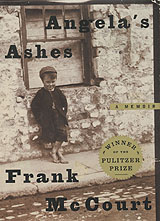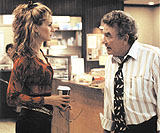By Danielle Daniel staff reviewer Arresting physical immediacy, penetrating facial expressions and deep coloring and shading are trademarks of the little-known but highly influential Italian Renaissance portraitist Giovanni Battista Moroni - a painter whose bold illustrations are currently on display in a tiny exhibition at the Kimbell Art Museum. While viewers will get to see only 10 of this artist's creations, the small, intense showcase titled "Giovanni Battista Moroni: Renaissance Portraitist" is just enough to savor the lifelike details cast out in beautiful shades of dark greens, reds and pinks, or starkly contrasted in shades of black and gray. My favorite portrait of the collection is the famous "Portrait of a Cleric," one of Moroni's later designs painted in 1570. This captivating image shows a black-clothed, older man twisting his upper torso - as if suddenly interrupted from reading the book in his hand - to stare directly at us, the intruders. The image feels eerily real because the cleric's white collar and softening, lighted gray background highlight the wrinkled, nude contours of his face.
One religious portrayal, "Portrait of a Man Before the Virgin and Child," almost juts its male subject out from the frame so that we are positioned alongside the patron to pay devotion to the Virgin Mary in the distance. Notably, this pairing of portraiture and religious theme is an invention of Moroni. Moroni also honored some female patrons by painting full-length portraits that included the entire physique of the patron instead of only the upper body. This full-length portrait style usually was reserved for only men, who were dignified enough to have their whole physical presence captured in painting. In the exhibit, one such tribute is the "Portrait of Isotta Brembati" which shows the lavishly dressed poet and aristocrat sitting upon a throne-like chair, holding a delicate fan made of feathers. Ironically, this intellect holds a dainty fan rather than a book like her male counterparts. Nonetheless, Moroni chose to render her in an unconventional way usually privileged for male patrons. For budding and established art historians, this exhibit will be a treat because it is the first of its kind in America for the Italian painter who has been said to have impacted such greats as Caravaggio and Velázquez. For less intense art enthusiasts, like myself, this exhibit is a quick thrill of spicy colors and details that displays portraits with a surprisingly strong physical presence. Stroll through this exhibit and then check out the permanent collection that features my Kimbell favorites, Edvard Munch, Henri Matisse and Caravaggio.
Danielle Daniel
By Kristina Iodice Skiff staff It is the sad truth that a bad childhood is more interesting than a happy one, and Frank McCourt had it in spades. "Angela's Ashes" quickly became something of a national phenomenon after publication a few years ago, winning numerous awards, including the Pulitzer Prize and even making it to the big screen thanks to Hollywood and Paramount Pictures. Many of the books favored for mass popularity are usually average, but for once, the book chosen for the spotlight is well worth the read. McCourt was born in Brooklyn to Irish immigrants, but his family went back to Ireland where he grew up on the dole with his father's alcoholism. He survived near starvation, beatings by the schoolmasters and everything else unimaginable. Even during their brief time in New York, the McCourt family led a precarious life. As awful and neglectful as Malachy, McCourt's father, could be, there were also tender moments, like when he tells a very young McCourt the story about Cuchulain, who became a great Irish hero. Malachy nurtured in young McCourt an appetite for stories.
It is this love of stories that stayed with McCourt during his childhood in Ireland and eventually in America after he leaves Limerick for good. His family clung to life in a flat so miserable that every year they had to cram themselves into an upstairs room when winter floods made the place only half-habitable. The upstairs room was named "Italy" and was warm and dry. Downstairs was Ireland - wet and cold. McCourt's father would sit up there drinking tea, while his mother, Angela, was so depressed she often could not rise from bed, or she would sit by the fire waiting for her husband to return. When he did, frequently drunk on their little money, he would line up the boys at all hours of the night and extract promises that they would die for Ireland. It is a wonder that McCourt survived his childhood in the slums of Depression-era Limerick, Ireland. Three of his siblings did not, dying of minor illnesses complicated by near starvation. Dying was what everyone seemed to do best: the little sister, the twins, the girl Frank first loved, the old man Frank read to, too many boys from school, too many neighbors, too many relatives. McCourt himself nearly died of typhoid fever when he was 10. Even more astonishing was how generous of spirit he became: stealing food for his brothers when his mother refused to get out of bed and his father was in England and still loving his family despite the poverty. McCourt spares the reader no details: the stench of the one toilet shared by an entire street, the insults of the charity officers, the marauding rats, the street fights, the infected eyes the fleas in the mattress. The memoir probes the first 16 or so years of McCourt's life. There is a certain innocence through every page. The innocent cruelty of family members is accepted without question. He shares about finding his first job and being able to pay his own way. There are things McCourt witnesses as a child that might horrify some readers, begging for a pig's head for Christmas dinner and stealing lemonade for his mother who refuses to get out of bed. All of this would be merely stereotypical complaint in less capable hands, but McCourt's mastery of language manages to make us understand the gentleness, forgiveness and humor that accompany misery and enables its protagonists to survive with dignity. There is poetry woven in all the stories contained within his memoir. It is a story about real life, a life of poverty and death that most people would want to ignore. "Angela's Ashes" is a beautifully written memoir full of Irish wit and pathos, and the humanity within it makes it stand out among the garden variety of youthful reminisces.
Kristina Iodice
Julia Roberts
When Erin decides to research a case a little bit further, she discovers a scandal involving a utility company that may have been poisoning a community's water for years. She creates a relationship with every single one of the people in this tiny California town, which reminds us why Julia Roberts is so charming. I have to say that this was Julia Roberts' best performance, as far as dramas go. It showed her wide range of emotions. We know she can make us laugh, but now we know that she can make us cry as well as annoy us too. She'll leave you breathless after several hilarious and outrageous monologues. Another great cast member was Albert Finney, who gave a lovable performance as Erin's boss. With the help of Brockovich, he remembers why he became a lawyer in the first place. Director Steven Soderbergh, who's credits include "Out of Sight", makes sure to capture every side of the story. We not only sympathize with the single mother, but with the rich lawyers and all of the plaintiffs. I would only advise caution as far as language goes. But don't wait for this one to come out on video. Lindsay Williams |
| The TCU Daily Skiff © 1998, 1999 Credits |
 All of the portraits in this collection
have an energetic quality to them, as if they are moving out of the picture
plane toward us. Often, it is this illusion of movement that makes each
portrait exciting and realistic for the viewer.
All of the portraits in this collection
have an energetic quality to them, as if they are moving out of the picture
plane toward us. Often, it is this illusion of movement that makes each
portrait exciting and realistic for the viewer.  One of many striking moments is when McCourt,
in the hospital charity ward recovering from typhoid fever, read his first
lines of Shakespeare. As a child, the words did not make sense, but the
beauty of the language caught his attention. "If I had a whole book
of Shakespeare, they could keep me in the hospital for a year."
One of many striking moments is when McCourt,
in the hospital charity ward recovering from typhoid fever, read his first
lines of Shakespeare. As a child, the words did not make sense, but the
beauty of the language caught his attention. "If I had a whole book
of Shakespeare, they could keep me in the hospital for a year." Personally, I never thought of Julia Roberts as "the
girl next door." And, you might as well forget about that for her
new movie "Erin Brockovich." Roberts plays a tough and determined
single mom who finds herself out of a job and out of nice things to say.
She starts working at a law firm even though she has no college education
and hardly any experience. But her wise cracks, guts and need to provide
her kids with a better life get her through this new job.
Personally, I never thought of Julia Roberts as "the
girl next door." And, you might as well forget about that for her
new movie "Erin Brockovich." Roberts plays a tough and determined
single mom who finds herself out of a job and out of nice things to say.
She starts working at a law firm even though she has no college education
and hardly any experience. But her wise cracks, guts and need to provide
her kids with a better life get her through this new job.